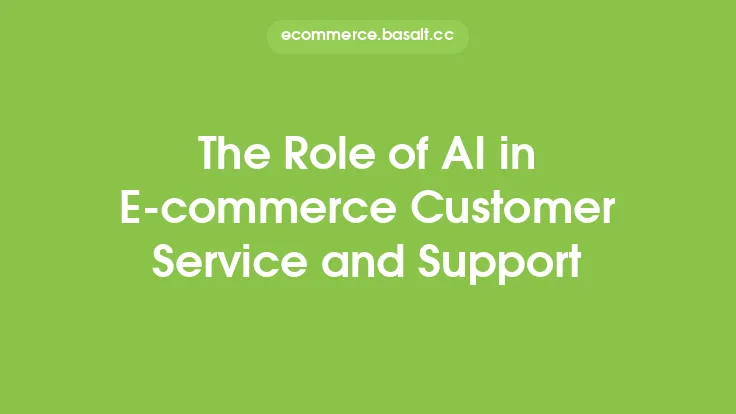Providing 24/7 customer support is a crucial aspect of e-commerce, as it allows businesses to cater to customers across different time zones and provide assistance whenever they need it. In today's fast-paced digital landscape, customers expect immediate responses to their queries, and a 24/7 support system helps to build trust, increase customer satisfaction, and drive sales. To achieve this, e-commerce businesses need to implement a well-planned strategy that includes a combination of human support, automation, and technology.
Understanding the Importance of 24/7 Customer Support
24/7 customer support is no longer a luxury, but a necessity for e-commerce businesses. With the rise of online shopping, customers can browse and purchase products at any time, and they expect to receive support whenever they need it. A 24/7 support system helps to increase customer satisfaction, reduce cart abandonment rates, and improve overall customer experience. Moreover, it also helps to build trust and credibility with customers, which is essential for driving sales and revenue.
Building a 24/7 Customer Support Team
Building a 24/7 customer support team requires careful planning and execution. E-commerce businesses need to hire a team of skilled and knowledgeable support agents who can provide assistance to customers via multiple channels, including phone, email, chat, and social media. The team should be trained to handle a wide range of customer queries, from simple product-related questions to complex technical issues. Additionally, the team should be equipped with the necessary tools and technology to provide efficient and effective support.
Leveraging Technology for 24/7 Customer Support
Technology plays a vital role in providing 24/7 customer support. E-commerce businesses can leverage tools such as chatbots, AI-powered support systems, and automated email responders to provide immediate assistance to customers. These tools can help to answer frequently asked questions, provide basic product information, and route complex queries to human support agents. Moreover, technology can also help to streamline support processes, reduce response times, and improve overall customer experience.
Creating a Knowledge Base for 24/7 Customer Support
A knowledge base is a critical component of a 24/7 customer support system. It provides customers with a self-service platform where they can find answers to frequently asked questions, product information, and troubleshooting guides. A well-structured knowledge base can help to reduce the number of support queries, improve response times, and enhance overall customer experience. E-commerce businesses should ensure that their knowledge base is up-to-date, easy to navigate, and accessible across multiple devices.
Measuring the Effectiveness of 24/7 Customer Support
Measuring the effectiveness of 24/7 customer support is crucial to identify areas of improvement and optimize support processes. E-commerce businesses can use metrics such as first response time, resolution rate, customer satisfaction score, and net promoter score to evaluate the performance of their support team. Additionally, they can also use analytics tools to track customer behavior, identify trends, and anticipate support queries. By measuring the effectiveness of their 24/7 customer support, e-commerce businesses can make data-driven decisions to improve their support processes and enhance overall customer experience.
Overcoming Challenges in Providing 24/7 Customer Support
Providing 24/7 customer support can be challenging, especially for small and medium-sized e-commerce businesses. Some of the common challenges include hiring and training support agents, managing support queries across multiple channels, and ensuring consistent support quality. To overcome these challenges, e-commerce businesses can outsource their support operations to third-party providers, use cloud-based support tools, and implement a robust quality assurance process. Additionally, they can also use automation and AI-powered tools to streamline support processes and reduce the workload of human support agents.
Best Practices for Providing 24/7 Customer Support
To provide effective 24/7 customer support, e-commerce businesses should follow best practices such as hiring skilled and knowledgeable support agents, leveraging technology to streamline support processes, and creating a comprehensive knowledge base. They should also ensure that their support team is trained to handle a wide range of customer queries, and that they have the necessary tools and resources to provide efficient and effective support. Moreover, e-commerce businesses should also prioritize customer satisfaction, measure the effectiveness of their support processes, and continually optimize and improve their support operations to meet the evolving needs of their customers.
Conclusion
Providing 24/7 customer support is a critical aspect of e-commerce, as it helps to build trust, increase customer satisfaction, and drive sales. To achieve this, e-commerce businesses need to implement a well-planned strategy that includes a combination of human support, automation, and technology. By building a skilled and knowledgeable support team, leveraging technology, creating a comprehensive knowledge base, and measuring the effectiveness of their support processes, e-commerce businesses can provide effective 24/7 customer support and enhance overall customer experience. By following best practices and continually optimizing and improving their support operations, e-commerce businesses can stay ahead of the competition and achieve long-term success in the digital marketplace.





